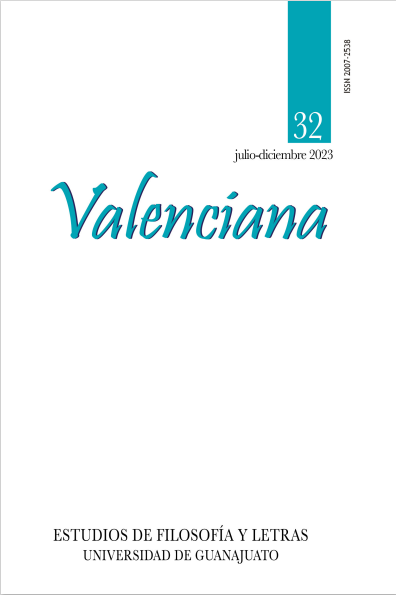Aristotelianism and Modern Science in New Spain. The Guanajuatense Jesuit Andrés de Guevara y Basoazábal’s De philosophiae vicissitudinibus
DOI:
https://doi.org/10.15174/rv.v16i32.688Abstract
The novohispanic jesuit Andrés de Guevara y Basoazábal (1748-1801) wrote the Institutionum elementarium philosophiae, where he offers a desirable curriculum for the mexican youth that may include empirical modern science, virtuous politics and human wisdom. Through a comparative translation from latin, this paper outlines Guevara biographically and, with the translation of some relevant passages, aims to: 1) show the reception of modern science according to the aristotelian elements Guevara has, 2) to show the reception of modern science from the aristotelian elements that Guevara had, and 3) demonstrate that modernity and aristotelian tradition are complementary; and what is to be reformed is decrepit scholastics. It is concluded that through the proemium De vicissitudinibus Guevara shows that the Mexican reception of modernity comes from an aristotelian thought.
Published
How to Cite
Issue
Section
License
Copyright (c) 2023 Gabriel González Nares, mmeza

This work is licensed under a Creative Commons Attribution-NonCommercial-NoDerivatives 4.0 International License.
Author(s) who publish in this journal do accept the next conditions:
According to copyright regulations, Valenciana does recognize and respect the authors’ moral right, as well as the right of property, which will be assigned to the journal for its diffusion in open access.
Valenciana does not charge authors for the submission, editorial process or publication in the journal.
All texts published and distributed by Valenciana (without exception) are supported by the license Creative Commons Attribution-NonCommercial 4.0 International (CC BY-NC 4.0), which allows third parties to use the publication as long as they mention the author and the first publication.
Authors can make other independent and additional contractual agreements for the non-exclusive use of his article published in Valenciana (e.g. including it in an institutional repository or in printed/electronic media), as long as it is explicitly clarified that the article was published for the first time in this journal.
For these purposes, authors must sign and send the letter of submission and copyright transfer form in a PDF file to this email address: revistavalenciana@gmail.com
This journal is under a license by Creative Commons Atribución-NoComercial-SinDerivadas 4.0 Internacional (CC BY-NC-ND 4.0)).











